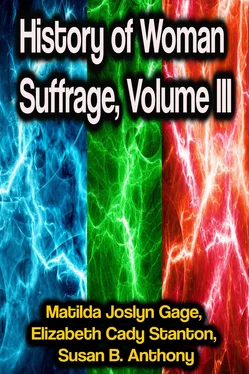Article 16, Sec. 1.—The right of citizens of the United States to vote shall not be denied or abridged by the United States or by any State on account of sex.
Sec. 2.—Congress shall have power to enforce this article by appropriate legislation.
The Committee on Privileges and Elections granted hearings to the National Association on January 11, 12, when the delegates,[28] representing the several States, made their respective arguments and appeals. Clemence S. Lozier, M. D., president of the association, first addressed the committee and read the following extract from a recent letter from Victor Hugo:
Our ill-balanced society seems as if it would take from woman all that nature had endowed her with. In our codes there is something to recast. It is what I call the woman-law. Man has had his law; he has made it for himself. Woman has only the law of man. She by this law is civilly a minor and morally a slave. Her education is embued with this twofold character of inferiority. Hence many sufferings to her which man must justly share. There must be reform here, and it will be to the benefit of civilization, truth, and light.
In concluding, Dr. Lozier said: I have now the honor to introduce Miss Julia E. Smith, of Glastonbury, Conn., who will speak to you concerning the resistance of her sister and herself to the payment of taxes in her native town, on the ground that they are unrepresented in all town meetings, and therefore have no voice in the expenditure of the taxes which they are compelled to pay.
Miss Smith said: Gentlemen of the Committee —This is the first time in my life that I have trod these halls, and what has brought me here? I say, oppression—oppression of women by men. Under the law they have taken from us $2,000 worth of meadow-land, and sold it for taxes of less than $50, and we were obliged to redeem it, for we could not lose the most valuable part of our farm. They have come into our house and said, "You must pay so much; we must execute the laws"; and we are not allowed to have a voice in the matter, or to modify laws that are odious.
I have come to Washington, as men cannot address you for us. We have no power at all; we are totally defenseless. [Miss Smith then read two short letters written by her sister Abby to the Springfield Republican .] These tell our brief story, and may I not ask, gentlemen, that they shall so plead with you that you will report to the Senate unanimously in favor of the sixteenth amendment, which we ask in order that the women of these United States who shall come after us may be saved the desecration of their homes which we have suffered, and our country may be relieved from the disgrace of refusing representation to that half of its people that men call the better half, because it includes their wives and daughters and mothers?
Elizabeth Boynton Harbert, vice-president for Illinois: Gentlemen of the Committee —We recognize your duty as men intrusted with the control and guidance of the government to carefully weigh every phase of this momentous question. Has the time arrived when it will be safe and expedient to make a practical application of these great principles of our government to one-half of the governed, one-half of the citizens of the United States? The favorite argument of the opposition has been that women are represented by men, hence have no cause for complaint. Any careful student of the progress of liberty must admit that the only possible method for securing justice to the represented is for their representatives to be made entirely responsible to their constituents, and promptly removable by them. We are only secure in delegating power when we can dictate its use, limit the same, or revoke it. How many of your honorable committee would vote to make the presidency an office for life, said office to descend to the heirs in a male line forever, with no reserved power of impeachment? Yet you would be more fairly represented than are American women, since they have never elected their representatives. So far as women are concerned you are self-constituted rulers. We cannot hope for complete representation while we are powerless to recall, impeach, or punish our representatives. We meet with a case in point in the history of Virginia. Bancroft gives us the following quotation from the official records:
The freedom of elections was further impaired by "frequent false returns," made by the sheriffs. Against these the people had no sufficient redress, for the sheriffs were responsible neither to them nor to officers of their appointment. And how could a more pregnant cause of discontent exist in a country where the elective franchise was cherished as the dearest civil privilege?—If land is to be taxed, none but landholders should elect the legislature.—The other freemen, who are the more in number, may refuse to be bound by those laws in which they have no representation, and we are so well acquainted with the temper of the people that we have reason to believe they had rather pay their taxes than lose that privilege.
Would those statesmen have dared to tax those landholders and yet deny them the privilege of choosing their representatives? And if, forsooth, they had, would not each one of you have declared such act unconstitutional and unjust? We are the daughters of those liberty-loving patriots. Their blood flows in our veins, and in view of the recognized physiological fact that special characteristics are transmitted from fathers to daughters, do you wonder that we tax-paying, American-born citizens of these United States are here to protest in the name of liberty and justice? We recognize, however, that you are not responsible for the present political condition of women, and that the question confronting you, as statesmen called to administer justice under existing conditions, is, "What are the capacities of this great class for self-government?" You have cautiously summoned us to adduce proof that the ballot in the hands of women would prove a help, not a hindrance; would bring wings, not weights.
First, then, we ask you in the significant name of history to read the record of woman as a ruler from the time when Deborah judged Israel, and the land had rest and peace forty years, even down to this present when Victoria Regina, the Empress Queen, rules her vast kingdom so ably that we sometimes hear American men talk about a return "to the good old ways of limited monarchy," with woman for a ruler. John Stuart Mill, after studious research, testifies as follows:
When to queens and emperors we add regents and viceroys of provinces, the list of women who have been eminent rulers of mankind swells to a great length. The fact is so undeniable that some one long ago tried to retort the argument by saying that queens are better than kings, because under kings women govern, but under queens, men. Especially is her wonderful talent for governing evinced in Asia. If a Hindoo principality is strongly, vigilantly, and economically governed; if order is preserved without oppression; if cultivation is extending, and the people prosperous, in three cases out of four that principality is under a woman's rule. This fact, to me an entirely unexpected one, I have collected from a long official knowledge of Hindoo governments. There are many such instances; for though by Hindoo institutions a woman cannot reign, she is the legal regent of a kingdom during the minority of the heir—and minorities are frequent, the lives of the male rulers being so often prematurely terminated through their inactivity and excesses. When we consider that these princesses have never been seen in public, have never conversed with any man not of their own family, except from behind a curtain; that they do not read, and if they did, there is no book in their languages which can give them the smallest instruction on political affairs, the example they afford of the natural capacity of women for government is very striking.
Читать дальше












